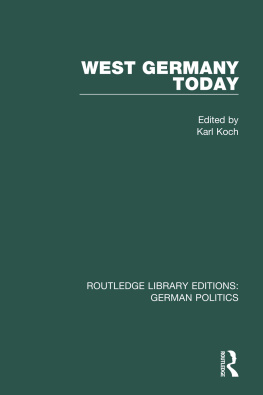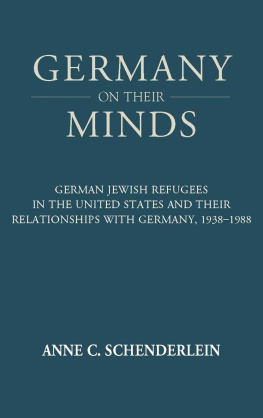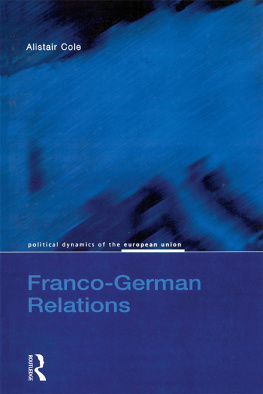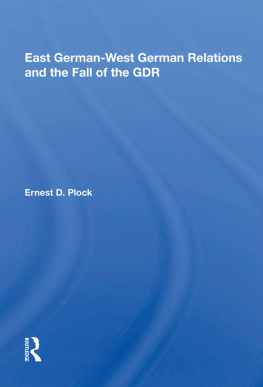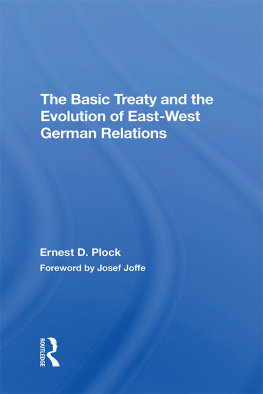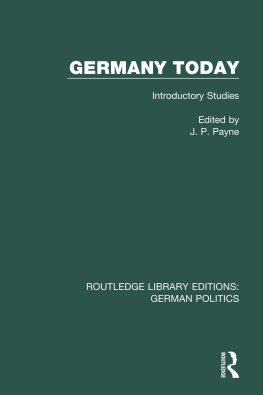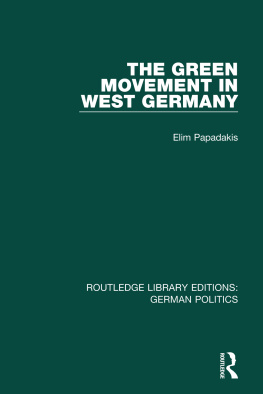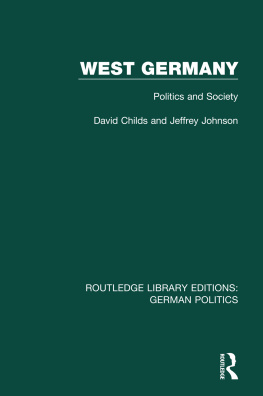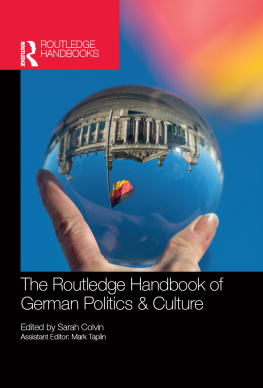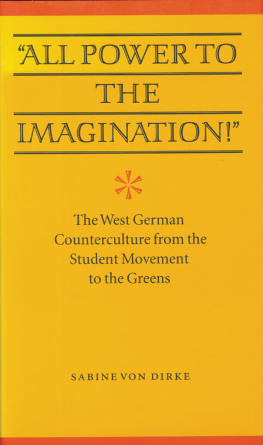ROUTLEDGE LIBRARY EDITIONS: GERMAN POLITICS
Volume 9
WEST GERMANY TODAY
West Germany Today
Edited by
Karl Koch
First published in 1989
This edition first published in 2015
by Routledge
2 Park Square, Milton Park, Abingdon, Oxon, OX14 4RN
and by Routledge
711 Third Avenue, New York, NY 10017
Routledge is an imprint of the Taylor & Francis Group, an informa business
1989 The collection as a whole Routledge
1989 The individual chapters the respective authors
All rights reserved. No part of this book may be reprinted or reproduced or utilised in any form or by any electronic, mechanical, or other means, now known or hereafter invented, including photocopying and recording, or in any information storage or retrieval system, without permission in writing from the publishers.
Trademark notice : Product or corporate names may be trademarks or registered trademarks, and are used only for identification and explanation without intent to infringe.
British Library Cataloguing in Publication Data
A catalogue record for this book is available from the British Library
ISBN: 978-1-138-83837-6 (Set)
eISBN: 978-1-315-72630-4 (Set)
ISBN: 978-1-138-84768-2 (Volume 9)
eISBN: 978-1-315-72629-8 (Volume 9)
Publishers Note
The publisher has gone to great lengths to ensure the quality of this reprint but points out that some imperfections in the original copies may be apparent.
Disclaimer
The publisher has made every effort to trace copyright holders and would welcome correspondence from those they have been unable to trace.
West Germany
Today
Edited by
Karl Koch
First published 1989
by Routledge
11 New Fetter Lane, London EC4P 4EE
29 West 35th Street, New York, NY 10001
The collection as a whole 1989 Routledge
The individual chapters 1989 the respective authors
Photoset by Rowland Phototypesetting Ltd,
Bury St Edmunds, Suffolk
Printed in Great Britain
by Richard Clay Ltd, Bungay, Suffolk
All rights reserved. No part of this book may be reprinted or reproduced or utilized in any form or by any electronic, mechanical, or other means, now known or hereafter invented, including photocopying and recording, or in any information storage or retrieval system, without permission in writing from the publishers.
British Library Cataloguing in Publication Data
West Germany today
1. West Germany, 1945
I. Koch, Karl
943.087
ISBN 0-415-01685-1
Library of Congress Cataloging in Publication Data
West Germany today/edited by Karl Koch.
p. cm.(University paperback)
Includes index.
1. Germany (West) I. Koch, Karl, 1940
DD258.3.W47 1989
943.087dcl9
Contents
West German politics today a historical
introduction |
| William Paterson |
| Gnther Kloss |
| Eric Owen Smith |
| Karl Koch |
This book is based on a series of symposia, which took place between 1981 and 1986, organized by the German sections of Portsmouth Polytechnic and the University of Surrey. Their principal feature was that they addressed themselves to undergraduates and concerned themselves with contemporary German issues, which ranged from political and economic problems confronting the German Democratic Republic to the economic, social, and political issues of interest in the Federal Republic of Germany. Academics and scholars who participated in the symposia were leading experts in the fields in which they made their contributions; the volume is drawn from a number of these.
The present work concentrates on some of the major developments in West Germany between the election of Helmut Kohl in March 1983 and his re-election in January 1987. This period, laying the foundation for the political, social, and economic framework of the late eighties, clearly marks a distinctive period for West Germany. Each contributor has focused on his specialism, and has identified the changes and the patterns which have emerged from this period, but also the underlying structures and the stability these have given to the West German societal framework. The chapters, therefore, converge on the change and stability of West German society and analyse and discuss the consequences of the Wende, that is the change in West German politics after 1982 and the remarkable continuity in many policy areas.
Karl Koch
Guildford, 1988
One
West German politics today a historical introduction
William Paterson
The political history of Germany since unification in 1870 has been one of marked instability and dramatic change. Imperial Germany collapsed as a result of military defeat in 1918. The Weimar Republic which succeeded it never enjoyed the unreserved support of all its citizens and was finally brought down by the effects of the 1929 Depression. From 1930 on, government on the basis of a parliamentary democracy was impossible and it finally succumbed to the sustained onslaught of Adolf Hitler and the National Socialist Movement in 1933.
The Third Reich of Adolf Hitler based on the principles of Fhrerprinzip (leadership principle) and Gleichschaltung (i.e. the abolition of all independent institutions) ended with the military defeat of Germany and Hitler's own death in May 1945.
Initial Allied intentions involved four-power control of Germany and the introduction of profound changes in German society. What was initially envisaged amounted to an 'artificial revolution' intended to bring about a profound democratization of German institutions and society. Growing suspicion and hostility between the Soviet Union and the Western Allies brought about the abandonment of both elements in Allied policy. Four-power control began to break down in 1946. At the same time, and largely as a consequence of deteriorating East-West relations, American attempts at profound social change faltered. The new accent was on stabilization of the Western zones and Germans living in the Western zones began to be perceived as potential allies. This change of attitude was most noticeable in relation to the United States who increasingly dominated the formulation of Allied policy in the Western zones of Germany. American policy after 1946-7 was conducted on the basis of a new assumption. The existing German elites were largely to remain in place but they must accept the principles of liberal capitalism and representative democracy. Given the scale of German defeat, the absence of alternatives, and fear of the Soviet Union, this was an offer which it was very easy for members of the German elite to accept.
The major concern of West German politicians in responding to Allied requests to set up a West German state was an understandable reluctance to accept German division. For that reason the constitution was called a Basic Law rather than Constitution, it was not subject to popular ratification and the preamble and a number of articles stressed the commitment to reunification.
The institutional structure which emerged out of the interplay of Allied preconditions and the West German democratic politicians who drafted and debated the Basic Law is an attempt to learn from the collapse of the Weimar Republic and the experience of the Third Reich. The executive institutions and the absence of plebiscitary devices testify to a desire to achieve stability occasioned by the fall of Weimar whilst the enshrinement of human rights, the federal principle, and a commitment to decentralization are calculated to avoid a repetition of the Third Reich.



